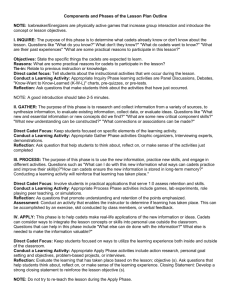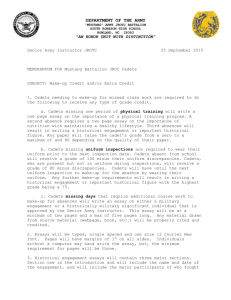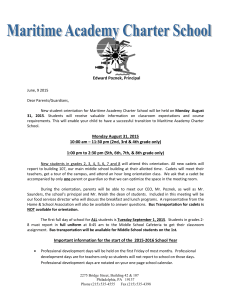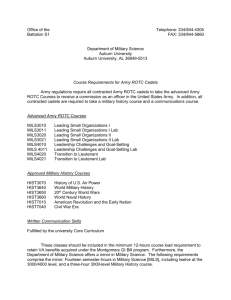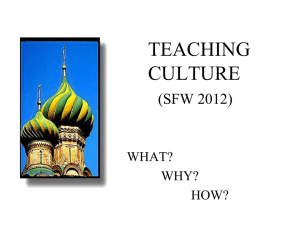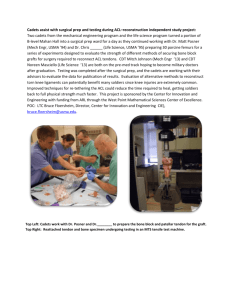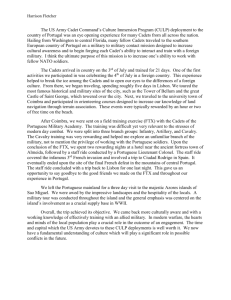Winter Newsletter Jan 12
advertisement
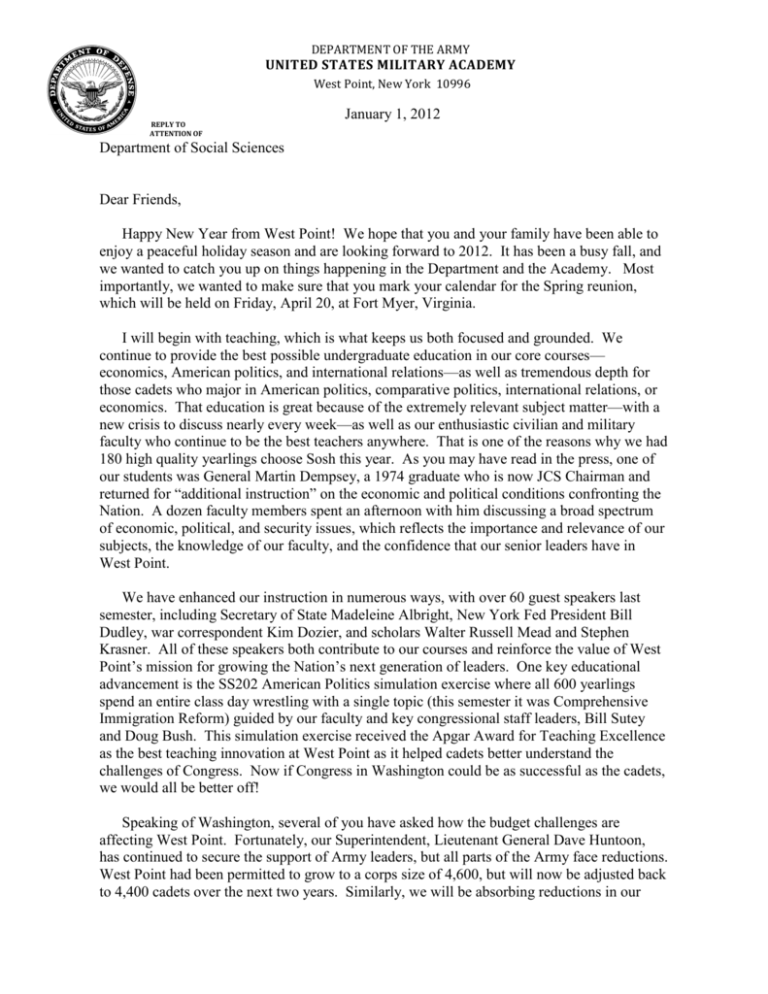
DEPARTMENT OF THE ARMY UNITED STATES MILITARY ACADEMY West Point, New York 10996 REPLY TO ATTENTION OF January 1, 2012 Department of Social Sciences Dear Friends, Happy New Year from West Point! We hope that you and your family have been able to enjoy a peaceful holiday season and are looking forward to 2012. It has been a busy fall, and we wanted to catch you up on things happening in the Department and the Academy. Most importantly, we wanted to make sure that you mark your calendar for the Spring reunion, which will be held on Friday, April 20, at Fort Myer, Virginia. I will begin with teaching, which is what keeps us both focused and grounded. We continue to provide the best possible undergraduate education in our core courses— economics, American politics, and international relations—as well as tremendous depth for those cadets who major in American politics, comparative politics, international relations, or economics. That education is great because of the extremely relevant subject matter—with a new crisis to discuss nearly every week—as well as our enthusiastic civilian and military faculty who continue to be the best teachers anywhere. That is one of the reasons why we had 180 high quality yearlings choose Sosh this year. As you may have read in the press, one of our students was General Martin Dempsey, a 1974 graduate who is now JCS Chairman and returned for “additional instruction” on the economic and political conditions confronting the Nation. A dozen faculty members spent an afternoon with him discussing a broad spectrum of economic, political, and security issues, which reflects the importance and relevance of our subjects, the knowledge of our faculty, and the confidence that our senior leaders have in West Point. We have enhanced our instruction in numerous ways, with over 60 guest speakers last semester, including Secretary of State Madeleine Albright, New York Fed President Bill Dudley, war correspondent Kim Dozier, and scholars Walter Russell Mead and Stephen Krasner. All of these speakers both contribute to our courses and reinforce the value of West Point’s mission for growing the Nation’s next generation of leaders. One key educational advancement is the SS202 American Politics simulation exercise where all 600 yearlings spend an entire class day wrestling with a single topic (this semester it was Comprehensive Immigration Reform) guided by our faculty and key congressional staff leaders, Bill Sutey and Doug Bush. This simulation exercise received the Apgar Award for Teaching Excellence as the best teaching innovation at West Point as it helped cadets better understand the challenges of Congress. Now if Congress in Washington could be as successful as the cadets, we would all be better off! Speaking of Washington, several of you have asked how the budget challenges are affecting West Point. Fortunately, our Superintendent, Lieutenant General Dave Huntoon, has continued to secure the support of Army leaders, but all parts of the Army face reductions. West Point had been permitted to grow to a corps size of 4,600, but will now be adjusted back to 4,400 cadets over the next two years. Similarly, we will be absorbing reductions in our -2workforce, with the Department losing one officer, one civilian faculty member, and two support staff members in the most recent cuts. We are working to ensure that we are able to best resource cadet instruction and other essential activities while leveraging external funding to augment our programs. We greatly appreciate your support for our activities as well as assistance with finding great future faculty members. If you know of anyone who may be interested in teaching in the Department, please refer them to the “Prospective Faculty” link at our website: http://www.dean.usma.edu/departments/sosh/. One of the highlights this fall was the 63rd annual SCUSA conference in which 340 cadets and student delegates from over 90 colleges and 42 countries discussed “Thinking beyond Boundaries: Contemporary Challenges to U.S. Foreign Policy.” Our panel included Ambassador Dell Dailey from the West Point class of 1971 (which sponsors SCUSA); Major General (promotable) Mary Legere, Commander of the Intelligence and Security Command; Gideon Rose, editor of Foreign Affairs; and Department alum Dr. Kori Schake, now at the Stanford’s Hoover Institution. Our keynote speaker was USAID Administrator Dr. Rajiv Shah, who was a University of Michigan SCUSA delegate in 1994. His speech coincided with the 50th Anniversary of President Kennedy establishing USAID and was particularly appropriate given the close working relationship between USAID and the military throughout the world. The Department continues to mentor cadets to compete in extremely competitive postgraduate scholarship competitions. Although five cadets earned Rhodes finalist interviews this year, and three cadets reached the same stage in the Marshall competition, regrettably fortune did not shine on any of these candidates to the extent that they walked away winners. The results of some other competitions are still pending, however, and we are delighted that eight members of the class of 2012 have been selected for Rotary Scholarships. Cadet extracurricular activities continue to complement our instruction, provide exceptional opportunities for leadership and academic development, and enhance the Academy’s reputation throughout the Nation. After finishing #9 last year, Army Debate is on track to retain its top 10 national ranking this year. Cadets have been Novice Division Champions in two back-to-back tournaments this fall, and the team has 12 individual speaker awards in its first five tournaments. Additionally, the 44th Invitational West Point Debate Tournament was a great success, with 300 participants from 25 schools in one of the largest and definitely the best run tournaments of the year. The West Point Model UN team continued to dominate internationally by winning at the Oxford University Conference for the third straight year, and the team is preparing to defend its fourth consecutive National Championship this spring. Tom Rick’s “Best Defense” blog even cited the value of the West Point Model UN Team, which you can see at: http://ricks.foreignpolicy.com/posts/2011/11/17/a_few_words_in_defense_of_west_point_they_sure_do_model_united_nations_well. The Domestic Affairs Forum (DAF) focused on education policy this term with trips to New York City, Washington, and Boston. They met with representatives from the Harlem Children's Zone in New York, two teachers' unions in Boston, and legislators on the Massachusetts House of Representatives Education Committee. Cadets also met with -3prominent media leaders ranging from Jon Stewart and the staff at The Daily Show to the editor and the staff at The Boston Globe. It is an interesting contrast for cadets to discuss which organization has more influence on American political discussions. Finally, DAF cadets joined David McCullough for a Constitution Day event at the National Archives. The Investment Club/Finance Forum routinely has 50-70 cadets attend its twice monthly meetings (without even luring cadets in with pizza). Cadets alternated between finance education sessions led by faculty and guest lecturers by practitioners including entrepreneurs, commodities traders, and investment bankers. These sessions educate cadets and prepare them to conduct research for investment decisions on the Spragin Fund, which was established over 20 years ago to help cadets apply their analysis to real world investments. Cadets also journeyed to New York City to visit the offices of Goldman Sachs, Credit Suisse, and NASDAQ to see finance in action and help understand how making decisions in a complex, uncertain, and volatile environment is a critical skill that is essential in the military and other occupations. While we only had one faculty member in Afghanistan (from the CTC mentioned below), we are continuing a robust research agenda to help the Nation anticipate and respond to future challenges. Over 20 faculty members received research funding from the Dean’s office and a dozen received support from the Institute of National Security Studies (INSS), led by Dr. Jim Smith at USAFA. This research included studies on NATO and the EU, Chinese influence in Sub-Saharan Africa, military responses to the Arab Spring, the relationship between counterinsurgency and economics, and a human security framework for combating terrorism. Other projects focused on the complexities of American civil military relations, the evolution of the U.S. National Guard, the character of the vice-presidency, and the quality of basic tools of liberal education. Much of this work has been or will be presented at key conferences including the American Political Science Association (APSA); the International Studies Association (ISA); the Inter-University Seminar on Armed Forces and Society (IUS), and the Western Economic Association (WEA). The Combating Terrorism Center (CTC) continues to provide world class education, research, and policy advice. In addition to having great contributions from our Distinguished Chair, General (retired) John Abizaid, one of the classroom highlights was having General (retired) Stan McChrystal teach classes for the Terrorism Minor students. On the research side, the CTC released two major research reports: "The Haqqani Nexus and the Evolution of al-Qa'ida" and "A False Foundation? AQAP, Tribes, and Ungoverned Spaces in Yemen." Don Rassler’s reward for co-authoring the Haqqani report was an all expense paid, three week trip to Afghanistan, to follow up on his analysis in support of International Security Assistance Force (ISAF) planning. We continue to educate policy makers, highlighted by LTC Reid Sawyer’s testimony in December before a joint Congressional Committee. Finally, the CTC continues to contribute to new frontiers such as cyber terrorism. LTC Jon Brickey has joined the CTC from Army Cyber-Command, and the Center hosted a unique conference in Chicago entitled "The Silent Tsunami of Cyber Threats: At the Intersection of Economic and National Security." This conference brought together business, academe, and defense industries to approach these issues from a counterintelligence perspective, recognizing that cyber threats are much more than a technical issue. -4- The Office of Economic and Manpower Analysis (OEMA) continues to provide trenchant analysis for Army and Defense Department leaders across a range of strategic human capital challenges. These include military pension and other compensation proposals, the Army drawdown, veterans’ unemployment, Army retention and marketing efforts, and officer talent management. In August, OEMA met with General Odierno as he transitioned to his duties as Chief of Staff of the Army, advising him on both human capital and economic issues. Additionally, the Green Pages talent management platform pilot continues with the Army’s Engineer, AG, and strategist officers. Most importantly, OEMA’s multi-disciplined faculty continues the critical mission of teaching cadets. We marked the end of the fall semester with a fun Holiday Party at Herbert Hall. Ruth Beitler continues to entertain with her poem (just know there are no secrets in Sosh!). All through the semester, in between intramurals and only four home football games, the faculty’s creativity was on full display at our periodic “vice” forums. These are the modern day versions of the legendary MEF meetings of yesteryear, and they have been great fun for the faculty. You can learn more about this new emerging tradition at the reunion! We are looking forward to a great 2012 and to sharing more about the Department at the Spring reunion. Details will be in the Spring newsletter in mid-March, but please mark the date on your calendar. The reunion will be at Fort Myer’s Spates Club at 6:00 p.m. on Friday, April 20. Wishing you and your family the best in the New Year! Best regards, Mike Meese Professor and Head Department of Social Sciences
